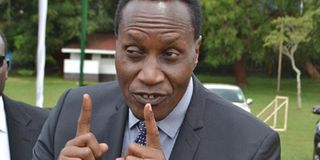International education forum kicks off in Nairobi

Education Cabinet Secretary Jacob Kaimenyi. The Global Monitoring Report: Education for All, 2000-2015, which was officially released on April 28, 2015 by Prof Kaimenyi reveals that older teachers in the country lose skills over time due to lack of in-service training. PHOTO | JEFF ANGOTE | NATION MEDIA GROUP
What you need to know:
- According to the 2015 Global Monitoring Report, “Donors largely failed on their commitment to deliver aid more effectively.”
- Head-teachers have also been forced to borrow funds and cutting down on feeding and crucial learning activities to survive due to delayed disbursement of free education cash.
The Education For All (EFA) Global Monitoring Report will be launched in Nairobi Tuesday Morning.
Education Cabinet Secretary Prof Jacob Kaimenyi will preside over the launch that will bring together key local and international stakeholders in the education sector.
The participants of the event, to be held at the Hilton Hotel, will discuss the successes and challenges of the last 15 years of the EFA movement.
The EFA Global Action Week is a worldwide annual campaign organised by the Global Campaign for Education (GCE) to raise awareness on Education for All. This year’s theme is, teaching and learning: Achieving quality for all.
There have been concerns that the achievement of the EFA goals suffered from the lack of financing by governments and donors while spending and expenditure on education has insignificantly changed since 1999.
According to the 2015 Global Monitoring Report, “Donors largely failed on their commitment to deliver aid more effectively.”
This is despite earlier commitments that no governments with a credible plan to achieve the EFA goals would be allowed to fail for lack of financing.
FREE EDUCATION
The report observed that low priority placed on investment in education has contributed to the failure to attain goals that the global community set itself to achieve in 2015.
These challenges are particularly common in developing countries. Kenya for instance, had a success story when the free education programme was started in 2003. The number of pupils enrolled in primary schools has almost doubled, from the time the programme was introduced.
It is however disturbing that thousands of pupils who sat their Kenya Certificate of Primary Education examination, have repeatedly missed places in secondary schools. The transition to secondary remains a big problem facing the Free Primary Education Programme.
Head-teachers have also been forced to borrow funds and cutting down on feeding and crucial learning activities to survive due to delayed disbursement of free education cash.
The report’s findings on the global picture of the education sector, are a pointer that the next education agenda should more clearly emphasize quality and equity. This is because equity in access and in the quality of education remain a huge problem.
“Education is a right, yet it is still denied to 72 million children who are out of school and to 759 million adults who are not able to read and write,” the Global Monitoring Report states.



